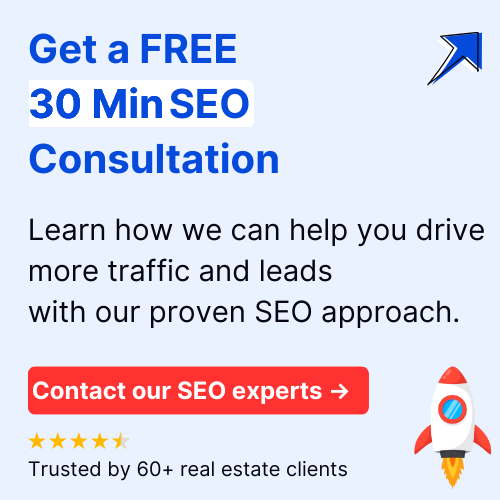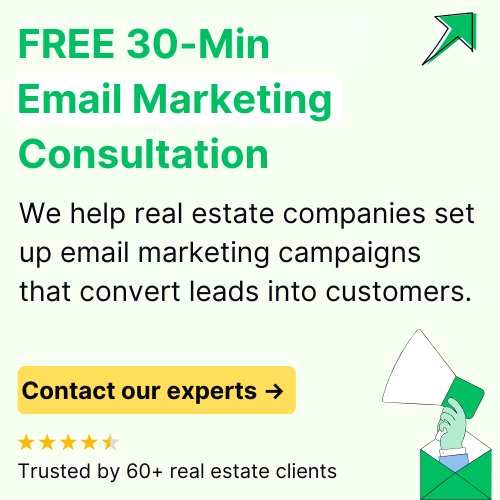SEO For Real Estate Investors: The MOST Actionable Guide

SEO For Real Estate Investors: The MOST Actionable Guide
This guide offers the most actionable guide on SEO for real estate investors. Are you a real estate investor frustrated by how your website’s buried in search results, unseen by potential clients?
Imagine the missed opportunities—investors and buyers search online daily, but your site remains hidden, leaving you empty pockets and wasted effort.
In fact, we’ve shared the exact steps that helped our real estate SEO clients increase traffic and generate leads.
Why is SEO important for real estate investors and agents?
Today, when almost everything starts with a Google search, having an online presence and appearing on Page 1 is more than necessary. If you’re a real estate agent or investor, you might wonder why you should even care about SEO (Search Engine Optimization).
Well, stick around, and we’ll break it down for you.
1. High budget and competition in PPC
Pay-per-click (PPC) advertising, where you pay every time someone clicks on your ad, can be expensive —especially in the real estate sector.
Competition is fierce, and the high bidding wars for popular keywords can quickly burn a hole in your pocket.
While PPC can deliver instant traffic, its cost-effectiveness is often questionable, particularly for small investors or agents just starting. In comparison, SEO can offer you a more budget-friendly way to reach potential clients over the long term.
2. Local market dominance with local SEO
The heart of the real estate business is in understanding local needs and trends.
You’re not just selling homes but neighborhoods, school districts, and a sense of community. Local SEO techniques help your business appear in local search results, such as Google Maps.
When someone in your area searches for “homes for sale” or “best real estate agent near me,” local SEO can help your website rank higher, helping you attract local leads.
Dominating the local search results means you are the go-to person in your area for anything related to real estate.
3. Compound benefit of investing in SEO
Think of SEO as a good real estate investment—it may take some time to see returns, but the benefits often compound once you do.
As you continue to invest in quality content, improve user experience, and gain backlinks, your website’s authority in the eyes of search engines goes up. As a result, your site ranks higher, attracts more traffic, and generates more leads.
Unlike PPC, where the benefits stop the moment you stop paying, the rewards of SEO efforts build upon themselves over time.
4. Targeted traffic equals higher conversion
SEO isn’t just about getting more visitors to your website; it’s about getting the right kind of visitors.
By optimizing for the right keywords, you attract people genuinely interested in buying or investing in real estate. This targeted traffic is much more likely to convert into sales or leads, making every visit more valuable.
5. Boost brand awareness
When your listings or blog posts start appearing on the first page of Google, people start to recognize and trust your name. Even if they’re not ready to make a real estate decision right away, your brand will be top-of-mind when they are.
This sort of brand awareness is hard to achieve through traditional advertising but comes naturally with effective SEO.
critical for real estate investors who may need to instill confidence in both sellers and potential partners.
You can learn about how to build your real estate brand in this detailed guide.
How to do SEO for real estate investors
Step 1. Tap into the power of Local SEO for real estate investors
Local SEO isn’t just “nice-to-have”; it’s absolutely necessary for real estate investors. Ignore it, and you risk ending up on Pages 2, 10, or 15 of search results, lost among the countless other real estate listings and investors in your area.
Get it right, and you’ll be the go-to expert when someone’s looking for property investments in your locality. So, let’s make sure you get it right!
1. Claim Your Google My Business Listing
First, claim your Google My Business listing if you haven’t already. This listing makes you appear in local searches and Google Maps.
49% of GMB pages receive at least 1000 views per month!
The more complete your profile, the more valuable it will be for potential clients and the more favorably Google will view it.
Think of it as your digital storefront. Make sure to fill out every section:
- Business name
- Address (or service area for those without a physical location)
- Phone number
- Business hours
- Business description
- Categories (like “Real Estate Agency” or “Property Investment”)
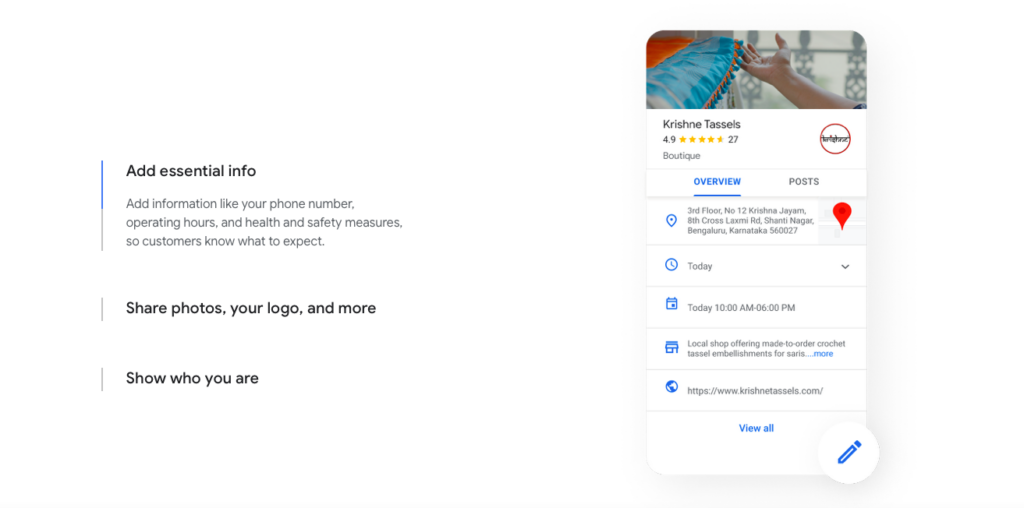
Learn how to optimize your real estate listing description with easy steps.
2. Use High-Quality Photos
Upload high-quality, relevant photos to make your profile visually appealing. It could include pictures of properties you’ve invested in, your team, or even before-and-after shots of renovation projects.
- Cover Photo: Choose a compelling cover photo that represents your business well.
- Profile Photo: Typically, your business logo works best here.
- Additional Photos: Showcase different aspects of your business. The more visual information you can provide, the better.
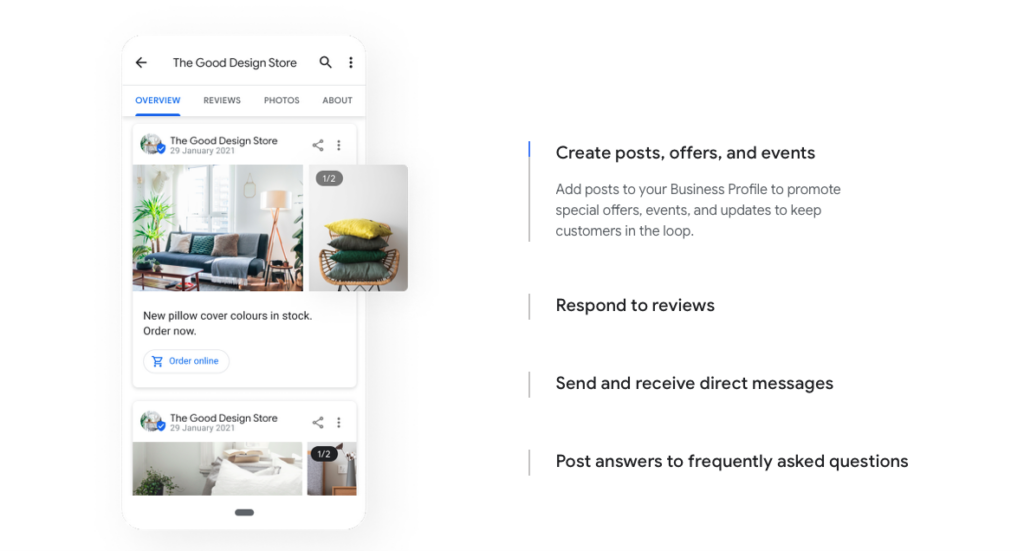
3. Leverage the ‘Posts’ feature
Google My Business allows you to make posts similar to social media updates. Use this feature to highlight promotions, share updates, or announce new property listings.
4. Get reviews
82% of consumers read online reviews for local businesses.
Ask satisfied customers for Google reviews. These reviews boost your credibility and ranking. And let’s be honest, We all look at reviews before making big decisions.
5. Local keywords
Remember those keywords we discussed? Here’s where your potential buyers/sellers get a local twist.
Use keywords that reflect your local area. Instead of just “homes for sale,” use “homes for sale in [Your City].” Insert these local keywords naturally into your website content, meta descriptions, and titles.
Check out our comprehensive list of real estate SEO keywords that will boost your organic ranking and page relevance for PPC campaigns.
6. Local content
Create blog posts and articles that speak to local events, news, or activities related to real estate.
For example, you might write a post titled “Top 5 Neighborhoods for Young Families in New York CIty.” This kind of content is great for local SEO and positions you as a local expert.
7. Local citations
Get your business listed in local directories. This isn’t just for old-school reasons; it helps your local SEO.
Make sure your name, address, and phone number are consistent across all platforms. Inconsistent information can confuse Google and lower your ranking.
Step 2. Conduct a comprehensive SEO audit for your real estate website
Imagine you’re renovating a house. Would you start tearing down walls without first checking the blueprints, structural issues, and potential improvements? Probably not.
Similarly, diving into SEO without a clear understanding of your website’s current state means wasted effort and missed opportunities.
An SEO site audit is your blueprint. It tells you what’s working well, what needs a quick fix, and what requires significant changes.
Here’s an example of how to structure your SEO audit report:
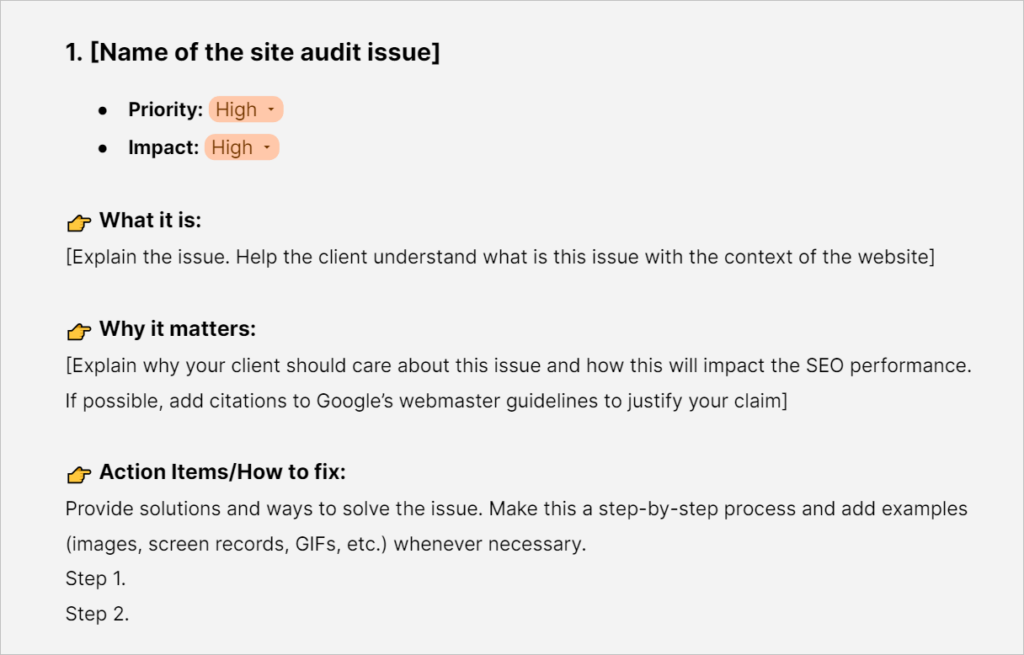
Without this audit, you’re essentially flying blind—unable to gauge your site’s existing performance or track improvements over time.
Here’s how to Perform an SEO Site Audit:
1. Use SEO site audit tools
Tools like Ahrefs Webmaster Tool and Screaming Frog are invaluable for crawling your website to identify existing issues and opportunities. These tools will go through your website similar to how Google does, giving you an insightful look into what needs attention.
2. Find technical issues
Once your site is crawled by these tools, you’ll get a list of problems, from minor to major. These could include things like missing meta descriptions, incorrect header tags, and slow-loading pages.
3. Prioritize the list of issues
Not all problems are equal. Some may prevent search engines from crawling or indexing your site, while others might be minor inconveniences. Sort this list by impact to know what to tackle first.
4. Look for broken links: These are like dead-ends – frustrating for users and a red flag for search engines. Fix them ASAP.
5. Check for Crawl Errors: In the dashboard of your SEO tool, look for a section about “crawl errors” or “site health.”
This will show you if Google is having trouble accessing any pages on your website. Make note of any errors so you can fix them later.
6. Orphan Pages: These are pages that aren’t linked to from anywhere else on your site. Make sure to integrate these into your site structure.
7. Redirect Issues: If your pages are redirecting incorrectly or inefficiently, it can hurt both user experience and SEO.
8. 404 Pages: These “Page Not Found” errors are frustrating for visitors and can harm your site’s credibility. Set up redirects for these URLs to more relevant pages.
9. Sitemap and Robots.txt File: Think of the sitemap as your house’s floor plan and the robots.txt as the rules of the house. Make sure both are up-to-date to guide search engines through your website effectively.
10. No HTTPS Security: Would you buy a house with no locks? Similarly, no one wants to spend time on an insecure website. Ensure you’ve got HTTPS enabled.
11. Canonical URLs: These tell search engines which version of a page to consider as the definitive one. It helps to prevent issues of duplicate content.
12. Mobile-Friendly and Page Responsiveness: More and more people are searching on mobile. A mobile-friendly, responsive design is a must.
13. Thin and Duplicate Page Issues: Thin pages with little content or duplicate pages can hurt your SEO. Think of this as decluttering your home. Only keep what adds value.
Step 3. Improve the website structure for easier navigation
Now that you’ve laid the groundwork with local SEO and audit your website, it’s time to focus on refining the very framework of your website structure.
The structure of your website is like the foundation of a house; if it’s not strong and easily navigable, the rest won’t matter much. In technical terms, you want to aim for a “flat site structure.”
But what does that mean, and why is it important? Let’s break it down.
What is a Flat Site Structure?
In a flat site structure, every page on your website is accessible within just a few clicks from the homepage. Specifically, users – and equally importantly, search engine crawlers – should be able to reach any page on your site in 4 clicks or less.
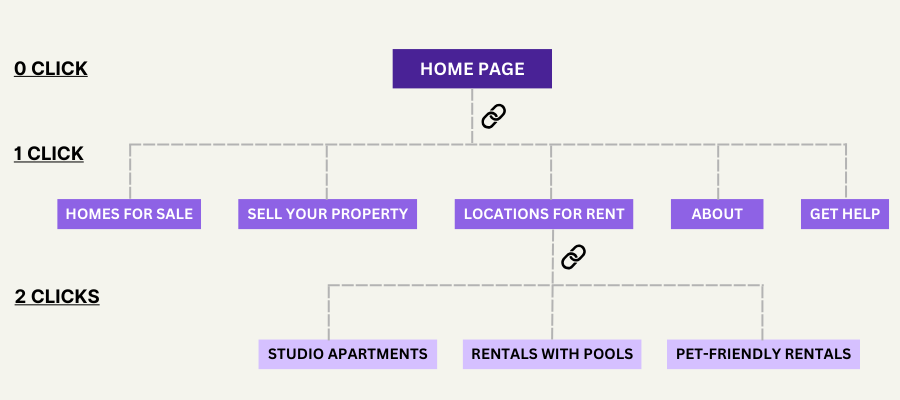
Why flat site structure for your real estate website is important:
1. Better Crawl Depth
When search engine bots (like Google’s crawlers) visit your site, they follow links from one page to another to index your content.
The fewer clicks it takes to get to a page, the easier and faster it is for these crawlers to index your entire site. This concept is known as “crawl depth.” A shallower crawl depth is generally better.
Why?
Because a crawler will have to traverse fewer pages to index all the essential content, making it more likely that your important pages will be indexed quickly.
2. User Experience and Conversion
Fewer clicks mean a smoother, more intuitive user experience for humans navigating your site.
It is essential for real estate investors, as you want prospective clients to effortlessly find property listings, contact forms, or investment opportunities.
How to Implement a Flat Site Structure
- Optimize Navigation: Your main menu should be easy to locate and use. Include important categories so they’re accessible straight from the homepage.
- Homepage Links: Add direct links to your most important pages from the homepage. For example, feature your top property listings and link them back to their respective detailed pages.
- Category Pages: If you have various types of properties or investment avenues, consider creating category pages that can serve as middlemen between the homepage and specific listings.
- Footer Links: Don’t underestimate the power of a well-structured footer. Use this space to add links to other pages like your FAQ, Blog, or Testimonials.
- Internal Linking: Make sure to have a robust internal linking structure within the content of your pages. It helps in navigation and also helps search engine crawlers index your content effectively.
Step 4. Thorough Keyword research for real estate investors
Keywords are the words or phrases potential clients type into search engines when looking for real estate opportunities.
And wouldn’t you want to be the one they find? So, here’s how to go about it.
Why do we need Keywords?
Well, without them, search engines wouldn’t know how relevant your content is to what people are looking for.
You want to show up when someone types “best real estate investment in [your area]” or “how to invest in real estate.”
That’s why you need to choose your keywords wisely.
Remember, every keyword is not a golden ticket. Some might bring you a lot of traffic but no actual clients.
This is why you need to prioritize keywords based on business value (most likely to drive leads or conversions), search demand, and ranking difficulty.
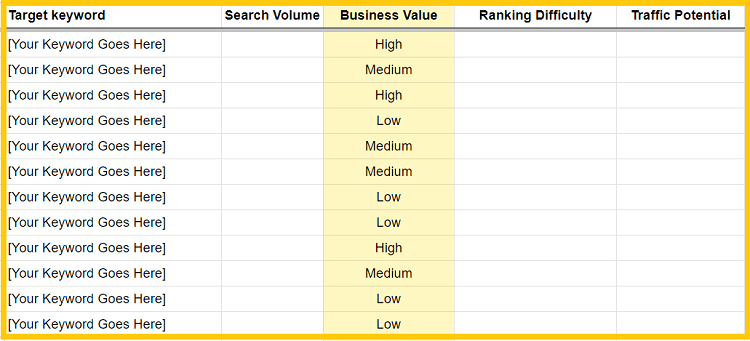
If you’re not familiar with how to identify high-business value keywords consider the following points:
- Medium-to-High Search Demand: You want enough people searching for these terms to make it worthwhile.
- Low-to-Medium Difficulty: Don’t go battling giants when you’re just getting started. Choose keywords you can actually rank for.
- Medium-to-High Business Value: These should be keywords that are likely to convert visitors into leads or clients.
How to build your real estate keyword list?
1. Do a competitor analysis
Start by researching what keywords your competitors are ranking for. Tools like Ahrefs or SEMrush can list keywords for which your competitors are showing up.
2. Use seed keywords
Begin with primary ‘seed’ keywords like “real estate investor,” “property investment,” or “buy homes in [Your Location].” Input these into an SEO tool like Moz or Ubersuggest. You’ll get a list of long-tail keyword variations that are worth considering.
3. Experiment with Google autocomplete
Simply go to Google and start typing in one of your seed keywords. Notice the suggestions that pop up? Those are commonly searched phrases and can be gold mines for keyword ideas.
4. Audit your Google Search Console (GSC) account
Your GSC account can be a fantastic source for actionable SEO that’s often underutilized.
Look for queries where you’re already appearing on Google’s second or third page. A little extra effort on these could quickly push you forward to the first page.
You can optimize your content for these specific queries, build quality backlinks to the page that ranks for that query, or improve the user experience.
Step 5. Craft SEO-Optimized, Conversion-Driven Content
A website with all the right keywords and a correct website structure can falter if its content doesn’t resonate with users or search engines. The next vital step is creating optimized SEO, conversion, and user experience (UX) content.
Why should you optimize your content?
- Quality content helps you rank higher in search engines, bringing you organic traffic.
- Good content engages the reader and persuades them to take action, like signing up for a newsletter or contacting you for services.
- A positive user experience keeps visitors on your site for longer, which can also be a positive ranking factor for Google.
What type of content should you create?
- Informative articles: Write pieces that explain the basics of real estate investing, market trends, or how-to guides.
- Local market analysis: Local content can help you rank for local keywords and attract an audience interested in specific markets.
- Case studies: Showcasing your past successes can build trust and attract new clients.
- Property listings: Detailed, SEO-optimized listings can help people looking to invest in real estate find your properties.
How do you optimize your content for SEO?
- Title tags and meta descriptions: Include target keywords in your title tags and meta descriptions. This helps in SEO and also improves click-through rates.
- Headers (H1, H2, H3): Use headers to break up content and include keywords naturally.
- Image alt text: Each image should have an alt text that describes what the image is about, and it’s an extra place to include your keywords.
- Keyword density: Don’t just stuff keywords; aim for a natural flow. A good rule of thumb is maintaining a keyword density of 1-2%.
How do you optimize your content for conversion?
- Clear CTAs: Calls-to-action (CTAs) should be evident and persuasive. Use buttons or highlighted text to guide the user toward taking an action.
- Benefit-driven headlines: Your headlines should not only contain keywords but also highlight a benefit the reader will gain from the content.
- Social proof: Reviews and testimonials can help improve your credibility and convince visitors to convert.
How to optimize for UX?
- Readability: Use short sentences, bullet points, and subheadings to make the text easier to skim through.
- Page Load Speed: Optimize images and scripts to make sure your page loads quickly.
- Mobile Responsiveness: Ensure the content looks good and functions well on mobile devices.
- Internal Linking: Use internal links to guide the user to other relevant content on your site.
Step 6. Build backlinks
Just as you’re more trustworthy if you’re known and vouched for by others, your website gains authority when other reputable sites link to it.
And guess what?
Search engines love authoritative websites and rank them higher. For a real estate investor or agent, this could mean better visibility for your property listings, blogs, or other valuable content.
1. Lay the foundation with essential links
Before you aim high, start with the basics. Create a solid foundation by securing links that are easier to obtain but still valuable.
Add your real estate investment business to reputable listing directories like Yelp or YellowPages. Don’t forget to complete your social media profiles and include a link to your website.
These actions make search engines more confident about your website’s credibility.
2. Turn your focus to high-quality homepage links
Once your foundational links are in place, it’s time to scale.
Try to acquire high-quality, authoritative links that point directly to your website’s homepage. Such links help distribute the acquired PageRank from your homepage to other internal pages, optimizing the site as a whole.
You can acquire these by collaborating with well-known real estate blogs, online magazines, or industry-leading publications for mutually beneficial relationships.
3. Leverage content platforms for link opportunities
Platforms like HARO (Help A Reporter Out), Featured, and Help a B2B Writer are excellent for gaining high-quality backlinks. These platforms allow you to offer expert opinions or quotes in exchange for a link to your site.
So, the next time you see a reporter seeking insights on the real estate investment market, don’t hesitate to contribute.
You’ll get a backlink and the chance to showcase your expertise.
4. Create linkable assets
Create ‘linkable assets,’ such as infographics, detailed guides, or interactive tools related to real estate investing or the market scenario. These assets are valuable resources that others will naturally want to link to.
And don’t underestimate the power of guest posting and email outreach.
Write personalized emails to blog owners or businesses within your industry, offering them high-quality, relevant content in exchange for a backlink.
When executed correctly, these tactics can generate a high number of powerful, industry-relevant links, improving both your SEO and your authority within the real estate community.
Common pitfalls to avoid while building links
- Buying links: This can get you penalized by search engines. Always opt for natural, high-quality backlinks.
- Irrelevant links: Make sure the sites that link to you are relevant to real estate or local business.
- Over-optimized anchor text: The clickable text (anchor text) for your backlinks should be natural and varied. Over-optimizing with keywords you’re trying to rank for can look spammy.
Step 7. Improve your E-E-A-T
E-E-A-T stands for Experience, Expertise, Authority, and Trustworthiness.
These are metrics Google uses to evaluate the quality and credibility of your website and content.
For real estate investors, demonstrating E-A-T can mean the difference between a potential client trusting you or moving on to a competitor.
Why is E-A-T important?
Search engines like Google aim to provide the best answers to users’ questions. They look at the E-A-T criteria to evaluate whether your content is reliable and valuable.
People usually deal with significant financial decisions when it comes to real estate investing.
The stakes are high, so your audience wants to know that the information they’re consuming comes from a trustworthy source.
How to improve E-A-T for real estate investors?
E-A-T is important for websites operating in sectors significantly affecting people’s lives and finances. We’re talking about YMYL categories, which include sectors like finance, healthcare, and, of course, real estate.
Let’s see how you can leverage E-A-T to your advantage as a real estate investor.
1. Demonstrate your expertise
- Content Creation: Regularly publish in-depth guides, analysis, or tips that only an expert in real estate investing could write.
- Credentials: Display any relevant certifications, training, or experience prominently on your About Us and Landing pages.
- Case Studies: Show off your successful investments with detailed case studies to prove your expertise in the field.
2. Build trustworthiness and credibility
When it comes to showcasing your expertise and trustworthiness, the content of your website speaks volumes. Here are some pages you should consider optimizing:
- About Us page: Use this space to tell your story. Highlight your experience in the real estate industry, showcase your team, and provide testimonials.
- Contact Us, Privacy Policy, Editorial Guidelines: Build trust by being transparent about your business practices. Make these pages easily accessible, clearly written, and up-to-date.
Also, secure your website with an SSL certificate (making your site HTTPS rather than HTTP), signaling that it’s safe for visitors to share personal information.
3. Use structured data to exhibit authority
Structured data is code that you place on your website to help search engines provide more informative results for users.
Here’s how you can use structured data to reflect your expertise in real estate:
3.1 RealEstateListing and RealEstateAgent Schema
This is important for those listing properties. It helps search engines understand the type, price, location, and other attributes of the property you’re selling.
Here’s an example of RealEstate listing schema type:
{
"@context": "http://schema.org",
"@type": "RealEstateListing",
"datePosted": "2023-09-06",
"about": "A description of the real estate listing.",
"accountablePerson": {
"@type": "Person",
"name": "John Doe"
},
"aggregateRating": {
"@type": "AggregateRating",
"ratingValue": "4.5",
"reviewCount": "10"
},
"headline": "Beautiful 3-Bedroom Home with a Spacious Backyard",
"inLanguage": "English",
"keywords": "3-bedroom, home, spacious, backyard",
"publisher": {
"@type": "Organization",
"name": "ABC Real Estate Agency",
"logo": {
"@type": "ImageObject",
"url": "https://www.example.com/logo.png"
}
},
"thumbnailUrl": "https://www.example.com/thumbnail.jpg"
}
3.2 Organization Schema on the Home Page
It helps in displaying company information in a Knowledge Panel. You can include your social profiles, logo, and contact information, among other things. For example:
{
"@context": "http://schema.org",
"@type": "Organization",
"name": "Example Real Estate Agency",
"url": "https://www.exampleagency.com",
"logo": {
"@type": "ImageObject",
"url": "https://www.exampleagency.com/logo.png",
"width": "200",
"height": "100"
},
"description": "A leading real estate agency providing quality services.",
"address": {
"@type": "PostalAddress",
"streetAddress": "123 Main Street",
"addressLocality": "Cityville",
"addressRegion": "Stateville",
"postalCode": "12345",
"addressCountry": "US"
},
"contactPoint": {
"@type": "ContactPoint",
"telephone": "+1-123-456-7890",
"contactType": "Customer Support"
},
"founder": {
"@type": "Person",
"name": "John Doe"
},
"foundingDate": "2005-01-15"
}3.3 Person Schema on the About Page
If your real estate investment business is more of a personal brand, then Person schema can be beneficial. It can include your name, job title, awards, social media profiles, and more.
Check out this guide on understanding different types of schema markups for real estate websites.
Step 8. Establish Key Performance Indicators (KPIs)
How do you gauge their effectiveness after implementing various SEO strategies and tactics? You do so by setting Key Performance Indicators (KPIs) that align with your goals.
Set your KPIs
For real estate investors, KPIs may look different than e-commerce or news websites. Your KPIs depend on your website’s maturity level, whether it’s a new site, an intermediate, or an authoritative one.
KPIs for a new real estate website
- Website traffic: For beginners, the fundamental indicator is the volume of visitors coming to your site. Use tools like Google Analytics to see if your numbers are increasing.
- Time spent on site: Are visitors sticking around or leaving immediately? Time on-site gives insights into user engagement.
- Bounce rate: This tells you the percentage of people who navigate away from your site after viewing only one page. A high bounce rate could mean your landing pages are not convincing enough.
- Page views per visit: If visitors view multiple pages, that’s usually a good sign that your content is relevant and valuable.
SEO KPIs for an intermediate or authoritative Website
- User retention: By now, you should not just be attracting new visitors but retaining older ones. Track this metric to gauge long-term value.
- Growth of the number of leads month-over-month
- Increase in qualified monthly traffic
- Organic ranking position of landing or transactional pages
- Conversion rate: Now that you’re getting decent traffic, how many are converting to leads or customers? This is a critical metric for ROI.
- Cost-per-acquisition (CPA): This helps you understand how much you spend to acquire each customer. A lower CPA means better ROI.
- SERP dominance: At this stage, you should aim to dominate search engine results for specific keywords critical to your business.
- Quality of backlinks: If other reputable sites are linking to you, search engines take it as a nod of approval. Use tools to assess the quality and quantity of backlinks.
KPIs like Page load speed and Local visibility should be tracked at every stage and improved upon regularly.
TIP: DO A MONTHLY REVIEW
Make it a habit to review your KPIs at least once a month. This way, you can spot trends, make necessary adjustments, and keep your SEO strategy agile and effective.
If you’d like to get an SEO expert view on your real estate website, learn about how much SEO will cost for real estate brands.
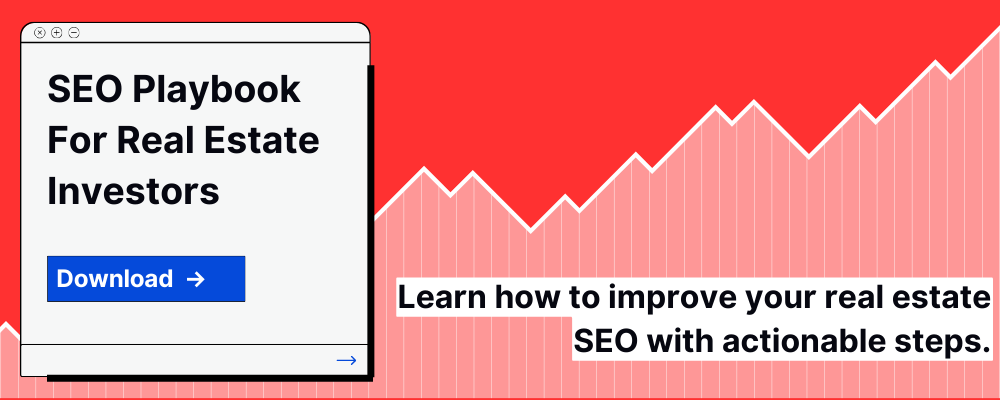
Final Thoughts
Mastering SEO is non-negotiable for real estate investors in today’s digital era. These aren’t just tips but actionable strategies to boost your online visibility and ROI.
If implementing the mentioned SEO strategies sounds overwhelming, we at UpInFifty are here to help you navigate the complexities. Our expertise can help you transform these action items into tangible results.
Contact us today and watch your real estate business grow in both visibility and profitability.

